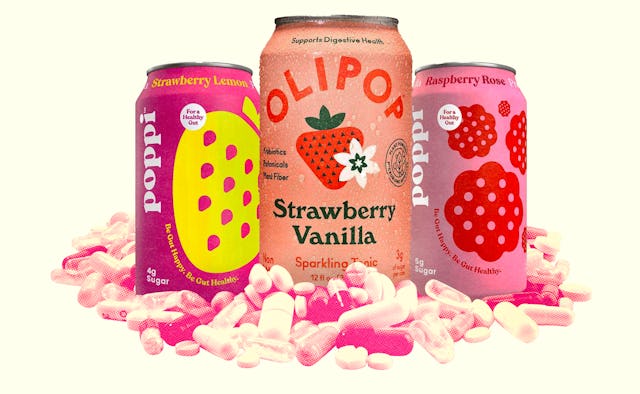Are Those Trendy Prebiotic Drinks Really Worth The Hype?
I asked a registered dietitian for the rundown.

Anyone with an interest in health and wellness — or even just a TikTok account — has probably heard about the latest trend in the beverage industry: kombuchas, smoothies, and mock sodas claiming to be “gut healthy.” But as we all know, it pays to ask some follow-up questions rather than just following the fads, especially when it comes to sodas like Poppi and Olipop, which seem like they might be a little too good to be true. Aren’t we supposed to be cutting back on soda? What about if they’ve got prebiotics?
Curious to know more (and hesitant to give up on these sodas, which, full disclosure, I really enjoy), I talked to some experts for more information.
What are prebiotics?
According to Perri Halperin, a clinical dietitian at Mount Sinai Hospital in New York, prebiotics and probiotics are an important part of any diet. And although they sound similar, they’re quite different.
Probiotics are essentially bacteria that live inside the body and aid some bodily functions. They can be found in cheese, pickles, kimchi, sauerkraut, and yogurt.
“Although people often think of bacteria as harmful, probiotics can help support various factors of health by helping to digest food and supporting gut flora, boosting immunity, and producing vitamins, among other ways,” Halperin says.
Prebiotics, on the other hand, are “nondigestible food components that stimulate the growth or activity of probiotics” and feed off probiotics, Halperin explained. They can be found in almonds, bananas, and flax.
Basically, when you consume prebiotics, more probiotics will grow in the body, resulting in good bacteria doing its magic where you need it to. By having three to five grams of prebiotics daily, you’re likely achieving that.
So, the sodas are healthy, then?
Unfortunately, just containing prebiotics (and boosting the body’s count of probiotics) does not mean something is plain and simply “good” for you. In the case of these sodas, Halperin says you have to remember their calorie and sugar counts.
Olipop, for instance, has 9 grams of prebiotic fibers per can, along with 35 calories and 2 grams of added sugar. Poppi contains 2 grams of prebiotic fibers, as well as 25 calories per can and 4 grams of added sugar. Poppi also has apple cider vinegar, which Halperin says has yet to be proven to benefit weight loss or acne-prone skin, despite what many people think.
While other sodas contain more sugar and have fewer health benefits, Halperin advises consumers to remain skeptical of sugar “trade-offs” and to consider opting for whole foods with prebiotics instead. “Beverages with calories and sugar can collectively increase throughout the day without you even noticing your intake,” she says.
Do your best!
So they’re not a straight-up health food, despite some benefits. But that doesn’t mean you have to cut them out entirely, either. The lesson here is to simply be aware of what you’re consuming. Poppi and Olipop are certainly healthier than regular soda, but they don’t replace whole foods like bananas or yogurt.
“Be skeptical of any claim that you can lose weight or improve health without significant lifestyle changes,” Halperin says. “Be a savvy label reader! Always look for added sugar and words that mean sugar, such as high fructose corn syrup, agave, cane sugar, and juice. Organic sugar does not matter! It is still sugar. And, of course, if something sounds too good to be true — it probably is.”
This article was originally published on